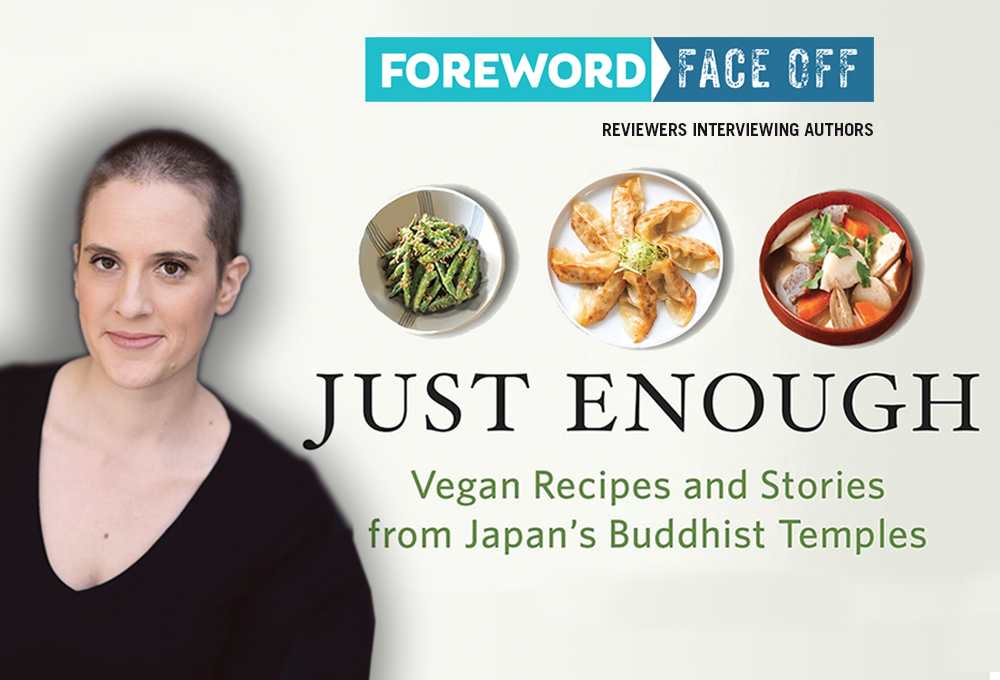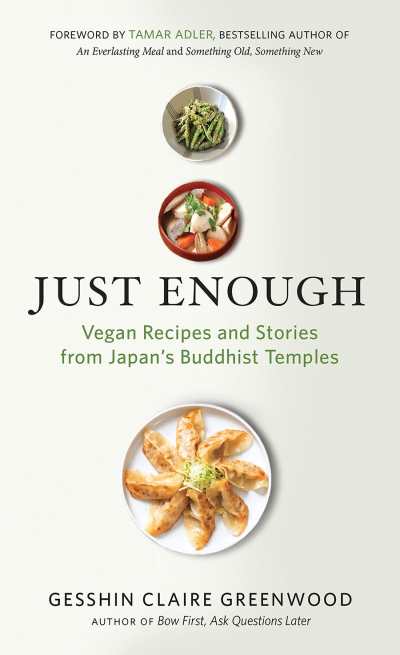Reviewer Interviews Gesshin Claire Greenwood, Author of Just Enough

Who among us wouldn’t benefit from a long stint in a Japanese Buddhist temple—sitting quietly, tending lotus plants and koi, eating honest food? For many wired-up Americans with chatterboxes for brains, the thought of such a retreat is wildly attractive, but never going to happen in reality, sadly.
Even so, you don’t have to dismiss the dream of a quieter mind, if you just employ one of the great recent insights into human potential: the power of tiny, incremental steps. Hear us out. If you want to start an exercise program after years of failed attempts, tomorrow simply stand for one minute while watching your favorite television show. Day after tomorrow, stand for ninety seconds and perhaps do two squats. The next day, go for two minutes of standing and three squats. And as the days progress, keep adding just a couple extra reps, and soon you’ll be biking or jogging for an hour, with the great sense of accomplishment that comes with meeting your own expectations because you set easily doable goals.

It’s not a stretch to apply the tiny steps approach to dieting, technology fasts, overdrinking, and yes, learning a more zen-like approach to life—take it from Gesshin Claire Greenwood, the author of Just Enough: Vegan Recipes and Stories from Japan’s Buddhist Temples. In her starred review for Foreword’s July/August issue, Jessie Horness writes, “If our lives are the sum of our small actions, then the essential act of eating is a fundamental building block. Just Enough is a proposal for eating and living with intention. … Balance and moderation are key, right down to the book’s suggested meal pairings.”
In our minds, moderation is spiritually aligned with tiny, incremental steps—so, we quickly lined up an interview between Jessie and Gesshin. Thanks to New World Library for lending a hand.
Jessie, take it from here.
I’m going to be super honest with you: I forgot this was a cookbook. The storytelling was so engaging I read it cover to cover in one sitting, reviewed it, and then got a message from my editor saying, “Hey, this is great, glad you liked it, could you add a little about the recipes?” What was your intention when you started writing? Did this project start as a cookbook with memoir worked in, or a memoir punctuated with recipes?
I did start this out as a straight-up cookbook. I had initially envisioned it with full color photographs, much like a mainstream cookbook. There are a few wonderful vegetarian temple cookbooks in Japanese, and I wanted to bring the same kind of product to the US. In fact, I spent a whole summer testing and retesting recipes for this book.
At some point, though, I reached a block where I had no idea what this book was. I had written the introduction about oryoki and just enough, and maybe the bamboo chapter, and then I had all of these recipes. But the whole thing felt disjointed and awkward. I hired a freelance editor named Alice Peck who was brilliant and sort of picked up the pieces of my writing from the metaphorical trash where I’d thrown them. She was basically like, “I think this book is about the poetry, meaning, and process of food.”
And as soon as she said that a lightbulb went off, and I was able to write the rest of the narrative—both personal and food related. Initially, I really had my heart set on color photographs for this book, but when the budget didn’t allow for that, I used my skill as a narrative writer to bring in the color, so to speak. I like to think that this book is actually two books in one. It is a cookbook that stands on its own as a cookbook (I spent a lot of time on those recipes!), but it is also a book about the poetry of food, as well as my own transition out of monastic life and into marriage.
I appreciate the nuanced way you sat with issues of both spiritual bypassing and cultural appropriation, as these shadow sides of spiritual journeys can be under-explored at times. Realizing that these are different but intersecting topics, can you speak a little to your experience of recognizing how spiritual bypassing and/or cultural appropriation was showing up in your journey, and how you went about reconciling that?
I’m glad you appreciated the part about cultural appropriation. I knew I would get flack for it, and there are already (a few weeks after publication!) white men posting on my Facebook with comments like “I don’t understand why you had to write about cultural appropriation.” I think it’s a tricky topic for white people to hear, which is precisely why I wrote about it. I have a platform—albeit, a very small one—but I will use whatever platform I have to talk about race issues. As you know, it was also something I struggle with personally. And I hadn’t thought of this before you mentioned it, but I do think spiritual bypassing and cultural appropriation fit together like a box with its lid, so to speak. It’s natural for human beings to want relief from suffering, and there is a push in Buddhism and other spiritualities to depart from the ego. There’s a lot of misunderstanding about what this actually means, and what better way to run away from yourself than to literally move to a country where you can’t speak the language and don’t understand any cultural cues? What better way to not deal with your own issues in your own cultural context?
For me, I think spiritual bypassing was a bigger issue than cultural appropriation. “Cultural appropriation” is actually kind of a confusing term; a more accurate one might be “cultural exploitation.” When I was in Japan, I don’t think I was exploiting it; I wasn’t stealing Japanese cultural products or profiting from it in a way Japanese people couldn’t. In fact, in Japan I was powerless. I had to work harder and longer for less recognition and acceptance. And I was abused—bullied, threatened, and other things. But while I don’t think I was exploiting Japan, I do think I was exotifying Japan and Japanese people. It was the “other” I thought would solve my problems and complete me, much like a romantic relationship in which one party idealizes the other but can’t see through the fantasy. Cultural appropriation/exploitation itself was more an issue for me when I returned to the US and started thinking about how I wanted to present these recipes and traditions. This is because, as a white person in the US, I have power. I don’t think I did a perfect job avoiding this.
Studying to be a therapist and going to therapy has done a lot to shed light on this exotification and my spiritual bypassing. It’s healing a lot in me and offering new outlets for spiritual practice that don’t involve looking to a foreign culture. Now I am finding myself less and less attracted to Japanese Zen and other Asian philosophies and spiritualities. I’m trying to reconnect with my roots and community. I’m finding myself attracted to the wild, nature-centered spirituality of my mother, godmother, and aunties. Western psychology is all about moving closer to yourself, which I was so uncomfortable doing in my early twenties. Japanese Zen, for me, was about moving away from myself. But the closer I get to myself (as elusive and transitory as that “self” might be), the more I am able to connect with this culture and the community that is around me.
What do you think it looks like to be living a mindful life in these tumultuous times?
Ok, mindfulness. Mindfulness just means paying attention on purpose. It’s not so hard. But I think we need more than mindfulness these days. We also need to unplug, to reconnect with nature, to cultivate joy in our daily lives. Recently I’ve been experimenting with DIY wellness weekends; I’ll turn off my phone Friday through Sunday, and spend the weekend doing yoga, meditating, spending time in nature, cooking with my family, and doing art. I have to be very intentional and very firm with myself to set a boundary within which I won’t work or be on the internet or allow my critical mind to dictate how I behave.
And finally, I want to eat everything in your cookbook. Any DIY tips or substitution secrets for those of us living in areas where ingredients are less available?
Regarding the recipes, definitely buy powdered dashi. That will make all the difference in the beginning. I write about this in the book, but people are really averse to buying anything in powdered form. I guess it’s because they want things to be “natural.” But when you have a headache you’re probably gonna reach for Tylenol instead of willow bark, you know? I think it’s the same with cooking. If you wanna cure your headache by harvesting willow bark and boiling it down to extract the salicylate acid, then fine. Do you! But you can also buy Tylenol. Same with dashi—it’s nice to sometimes make it from scratch, but it’s much faster and efficient to buy powdered dashi. In your case, I would just start by learning how to make rice and miso soup well. That’s a meal in itself. Once you get the basics down—how to make dashi, flavor profiles—expand to harder things.
Jessie Horness
